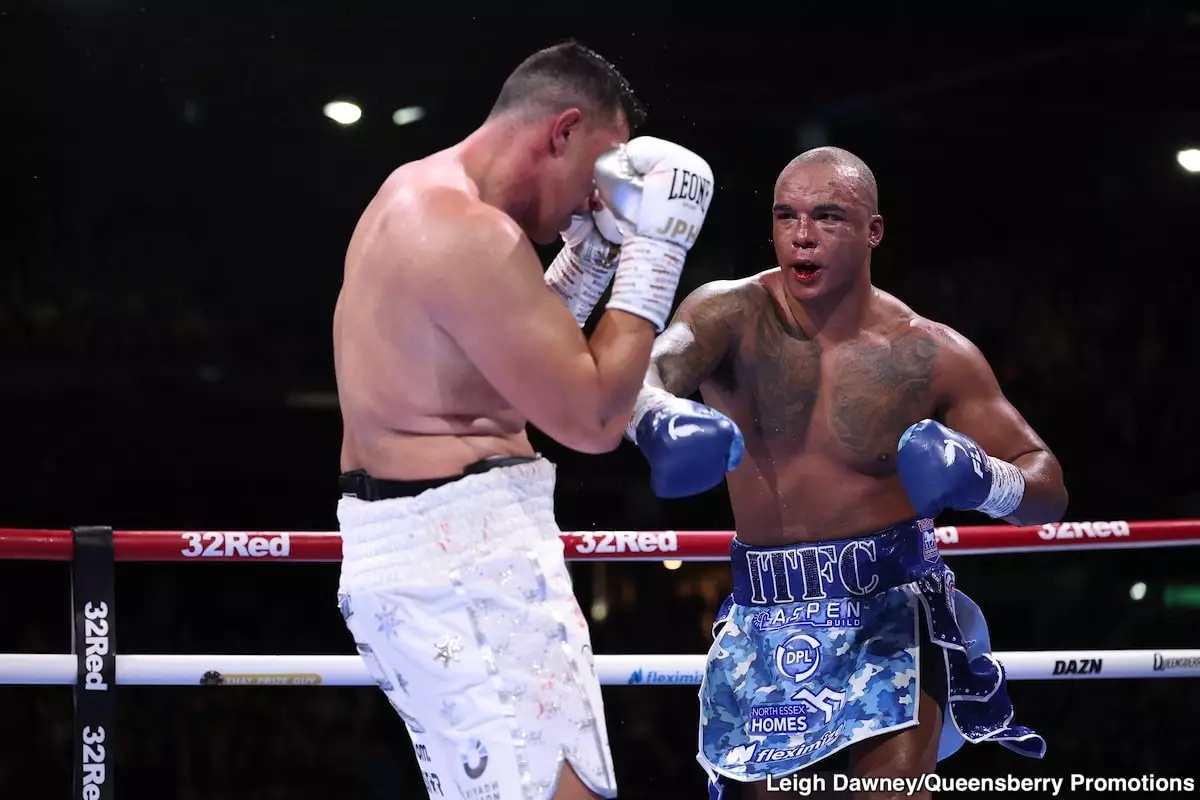The boxing ring is a sacred space, where athletes lay everything on the line to showcase their prowess, endurance, and courage. However, when the dust settles, the aftermath often incubates controversy, as seen in the recent clash between British heavyweight Fabio Wardley and Australian contender Justis Huni. Huni’s camp contends that the fight’s abrupt end was unjust, citing a premature stoppage by referee that prevented Huni from continuing in what could have been a pivotal moment. As the narratives evolve, it’s essential to dissect the sequence of events and the varying perceptions surrounding a fight that left fans polarized.
In the tenth round, Wardley executed an electrifying right hand that flipped the fight on its head, securing a victory that seemed improbable seconds earlier. The dynamics shifted rapidly, forcing Huni to the canvas. According to Huni’s team led by manager Mick Francis, the Australian was still in the game after being counted out despite what appeared to be a moment of vulnerability. Their call for a protest to the WBA—asserting that Huni was fit to continue—alleges that the referee’s decision was hasty and unfounded, igniting debates about officiating in boxing.
The Referee’s Role: A Tightrope Walk
Wardley, aware of the scrutiny surrounding the referee’s judgment, defended the stoppage by accentuating the discretionary power bestowed upon officials. He pointed out that a fighter must not only beat the count but also demonstrate mental and physical readiness to continue—a nuance often overlooked by the audience. This highlights the uphill battle referees face where any decision can lead to harsh criticism. An early intervention is sometimes seen as robbing fans of a thrilling conclusion, while a late stoppage can lead to grave consequences for the fighters involved.
Wardley raised an intriguing hypothetical during this debate, suggesting that should a reluctant Huni have been allowed to proceed unduly, the outcome might have been far worse. The example he offered—a barrage of strikes that could have left Huni unconscious—brings a chilling perspective to the conversation. It emphasizes the tremendous responsibility placed on a referee, who must act decisively to protect the fighters while also weighing the sport’s integrity and entertainment value.
Such scenarios underscore how the stakes are incredibly high, not merely for victory or defeat, but for the lasting health of the athletes involved. Boxing, after all, is not just about who lands the hardest punches; it is also about ensuring fighter safety, an aspect that should never be brushed aside.
Wardley’s Resolution and Huni’s Demeanor
In the aftermath of the fight, Wardley’s reactions reflect a broader understanding of the fight game’s nuances. He remains steadfast in his belief that the referee’s actions were within his rights, representing not just a personal victory, but a commitment to upholding safety and integrity within the ring. His perspective speaks volumes about the mentality that champions should embrace—one that prioritizes responsibility alongside competition.
Contrastingly, Huni’s post-fight demeanor reveals a level of grace under pressure that is commendable. By choosing not to engage in unnecessary disputes, he sets a tone of respect and professionalism, acknowledging Wardley’s hard-fought win. It remains to be seen whether Huni’s camp will formally lodge their protest against the outcome, but the Australian’s willingness to accept the result as is can foster a more constructive dialogue in the sport, aligning with Wardley’s focus on fighter safety.
Revisiting the Impact of Refereeing in Boxing
Instances like this one serve as compelling case studies of the intricate relationship between officiating and the athlete’s journey in boxing. Beyond the rivalries and aspirations, the responsibilities that referees bear cannot be overstated. Every decision they make is subjected to the scrutiny of fans, fighters, and their respective teams. However, in the heat of the battle, the nuance of their decisions is often lost in the fervor of emotion clouding the opinions of spectators.
Ultimately, the Wardley versus Huni bout is more than a tale of one fighter’s redemption; it is a reminder of the complexities intertwined within the sport of boxing. It invites both athletes and fans to engage in deeper reflections on what it means to compete and the ethical ramifications of those who oversee these gladiatorial contests. As passionate conversations unfold in boxing forums, it is clear that the dynamics of this bout will resonate for some time as a touchstone for future discussions about athlete welfare and officiating standards in the ever-evolving world of boxing.


Leave a Reply